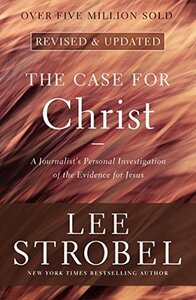Take a photo of a barcode or cover
399 reviews for:
The Case for Christ: A Journalist's Personal Investigation of the Evidence for Jesus
Lee Strobel
399 reviews for:
The Case for Christ: A Journalist's Personal Investigation of the Evidence for Jesus
Lee Strobel
hopeful
informative
inspiring
reflective
medium-paced
emotional
hopeful
informative
inspiring
reflective
medium-paced
Although this is a good book it is all about the forensic confirmation that the bible is accurate and not about the content.
challenging
hopeful
informative
inspiring
reflective
medium-paced
challenging
hopeful
informative
inspiring
reflective
slow-paced
informative
reflective
slow-paced
As an atheïst, I have heard lots of people defend their faith with "feelings". I just felt it's right, god spoke to me, and so on...That never impressed me as so many people of so many religions believe because of these feelings so we know for a fact that these feelings are, at best, only correct in 1% of the cases. (And that's being generous) As such I was very curious to read a book where a rational, legitimate case for religion was given. I was very much let down. The author claims to have been an atheïst at the beginning of his journey but if he ever really was one, it was by default and he had given very little, if any, thought as to why he didn't believe in any gods. He accepts weak arguments without hesitation or objection and seems pleased that the case in favour of christianity is gettting stronger (in his eyes) with each passing interview. Not exactly an objective standpoint. Seeing skepticism and atheïsm so poorly defended and each chapter being basically a clone of the previous one in which he lists all the academic achievements of the person interviewed, presents none to hardly any challenge at all to what they're claiming, offers no counter perspective and is at the end very exicted about faith, I eventually gave up about half way through. It is nothing more than an apologetics book disguised as a fair discussion, only to enjoyed by those who do not know or do not care for any of the real objections to christ and christianity. No real atheist (i.e. someone who has actually given some serious thought as to why they do not believe) would ever be convinced by the arguments offered in this book.
fast-paced
It's hard to write a review this. On the one hand, it set out to do a unique and worthwhile thing -- look at the claims of the New Testament from a scholarly and evidence-based standpoint. On the other hand, it failed to remain unbiased and did not actually touch on issues that a real non-believer or skeptic would find the most troubling. As Strobel points out in his conclusion, he couldn't possibly touch upon every question a person might have, but nonetheless I felt the things he focused on were only issues for people who already at least believe in God or have an underlying religious belief.
I was also unimpressed with his choice of scholars. Yes, they all have impressive backgrounds in theological studies, but they are also all active Christians. Interviewing other scholars without a belief in Christianity would have given this book a good, different perspective. Similarly, Strobel seemed to give more merit to some evidence than others without explaining why. I was particularly confused as to why he would totally discount the sociopolitical climate that contributed to the rise of Christianity.
Ultimately, I don't think the things Strobel wants to prove are provable in the way he is trying to prove them, but if they were I didn't feel he gave a thorough or scientific and unbiased view of things. He is a good, engaging writer, though.
I was also unimpressed with his choice of scholars. Yes, they all have impressive backgrounds in theological studies, but they are also all active Christians. Interviewing other scholars without a belief in Christianity would have given this book a good, different perspective. Similarly, Strobel seemed to give more merit to some evidence than others without explaining why. I was particularly confused as to why he would totally discount the sociopolitical climate that contributed to the rise of Christianity.
Ultimately, I don't think the things Strobel wants to prove are provable in the way he is trying to prove them, but if they were I didn't feel he gave a thorough or scientific and unbiased view of things. He is a good, engaging writer, though.





